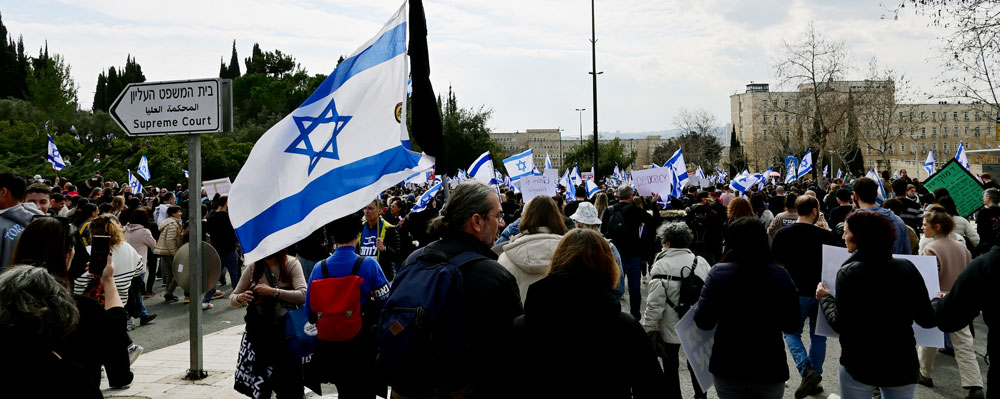Rabbi Justin David Thoughts from our New Rabbinical School Dean on Tisha B’Av, Israel, and Hope & Purpose

As we greet Tisha B’Av tonight, I am preoccupied by questions underlying all the conversations I’ve had around Israel in recent days: will the current government gut Israel’s commitment to prophetic and humanistic justice as enshrined in the Megilat ha-Atzma’ut (Scroll of Independence)? Can we dare to hope that Israel’s democratic protest movement can work? And do we have any other choice?
This year, I am choosing to see Tisha B’Av as a day of Jewish and spiritual practice to turn toward renewed hope and purpose, despite the feelings of powerlessness and resignation I have heard from many.
I’ll begin with what I’ve learned from our community.
Last week, at the britot for the sons of David and Rebecca Magazine Malamud, our teacher Rabbi Shani Rosenbaum spoke about the perplexing coexistence of joy and anguish around Tisha B’Av. She cited the baraita from Ta’anit 29a that builds on the language of the Mishna to compare the beginnings of Av and Adar: “as we limit joy with the beginning of Av, so we increase joy with the beginning of Adar.”
As Shani delved deeper into this intriguing text, she noted and reflected on how, contrary to expectation, we may experience joy and grief not as completely opposite experiences, but often surprisingly intertwined. In the context of the britot, Shani was holding the simcha alongside David and Rebecca’s loving tribute to Lea Andersen z”l, masterfully evoking the sense of a humanizing and healing whole. It was deeply moving for me to see how Shani, David, and Rebecca embodied in that moment what all of you our ordination students will have the great privilege to do in their own rabbinic and cantorial work.
Speaking and texting with friends in Israel over the past couple of days, I wish I could say that I heard something encouraging from them. Even one of my literary and moral heroes, the towering Israeli author and peace activist David Grossman, admitted via Ha’aretz that there were “no words to describe” what is taking place.
Nevertheless, I have been inspired by the nearly 20,000 people marching from Tel Aviv to Jerusalem, camping along the way and outside the Knesset, chanting, singing, and building community. The march, and the previous seven months of ongoing protest, remind us how essential social movements are to building power in order to generate hopeful purpose and eventual change. In the landscape of Israel, the march carries an additional element, looking and feeling like an aliyah l’regel, a mass, public demonstration of sacred commitment.
For me this year, the protests and their deeper dimensions are connected to the traditional core of Tisha B’Av. Over the years, I have come to understand Eichah, and by extension the holiday, as embodying its own form of protest against conventional ways of understanding God’s punishment and human agency. Railing against the severity of Jerusalem’s suffering at the hands of God, the author of Eichah struggles to find not only justice and order, but also purpose in human existence. Seemingly in opposition to the warnings of Deuteronomy, the early Prophets and Jeremiah, Eichah (which rabbinic tradition ascribes to Jeremiah) repeatedly calls God’s attention to the severity of human pain as if to say, “You’ve gone too far. We are flawed but did not deserve this degree of destruction. Where is Your compassion?”
In my view, the book makes a decisive turn at Chapter 3:40, offering a response to God’s seemingly arbitrary punishment through human self-reckoning and action: “Nachp’sah derakhenu v’nakhkora, v’nashuvah el Adoanai,” translated as “Let us rather test and examine our ways, and return to God.”
Anything that directs to examine our actions and engage in teshuvah seems promising, and this translation likely fits our conventional expectations for Tisha B’Av: in the face of destruction that we do not understand, we should look to our own wrongdoing and capacity for repair. In fact, the Gemara (Berakhot 5a) cites this very verse for the classic rabbinic belief that, should suffering befall a person, one should examine their deeds (y’fashfesh b’ma’asav) to uncover why they are suffering as a precursor for making amends. But whatever personal meaning we may derive from this line of thinking, it may also appear deeply problematic in many situations. Whatever our personal shortcomings this year (I include myself here), they have absolutely nothing to do with precipitating the actions of Israel’s ultra nationalist governing coalition.
However, in directing us to examine our ways and embrace teshuvah, it may be possible that the biblical author had an alternative strategy in mind, separating our inherent humanity from arbitrary and unjust pain. In the early chapters of the book, the narrator of Eichah forcefully states that he does NOT believe that the people of Jerusalem deserved their suffering to the extent meted out by God. In fact, in the verses leading up to the pivotal one I cited above, we hear the narrator struggling, like Job, to square God’s mastery of all creation with God’s excessive punishment of humanity.
But if the narrator believed the people were punished unjustly, why enjoin the readers to “examine our ways” and do teshuvah? As I see it, Eichah offers us a startling way of thinking about our connection to human suffering beyond our immediate control. Instead of assuming the inherent guilt and impossible burden of responsibility for extreme destruction, Eichah invites us to engage in a bold experiment. In the face of destruction that no human being deserves, and over which we have little or no control, we may choose to embrace the prospect of being more deeply human. And there be nothing more humanizing than drawing on our own compassion (and not God’s!) to engage in basic acts of accountability and repair.
Why does this matter now?
Because in this moment, we may find ourselves at a complete loss to see how our learning, our actions and our lives make a difference in the face of what appear to be ongoing political machinations that could bring real harm. If seven months of ongoing protests couldn’t prevent the passage of this latest and like first bill to limit the judicial oversight of Israel’s Supreme Court, what can we possibly do? It is a completely understandable set of thoughts and feelings.
But the moral and spiritual logic of Tisha B’Av can suggest that to search out (nachp’sah), investigate (nakhkora), and ultimately be a part of acts of reconnection and restoration (v’nashuvah) are not only personally meaningful, but collectively essential. In Eichah as in life, I believe these ways of living and being have the power to usher in a renewed moral and spiritual vision, expressed as an enduring longing at the end and the peak of Eicha: “Hashivenu Adonai elekha v’nashuvah, chadesh mimenu k’kedem,” Help us to return to You, Adonai, and we shall return.”
I am less than a week and a half into my relationship with my students at Hebrew College, my new community of learners and teachers. But I know already how this is a community where nechama is both personal and collective, found not only in illuminating wisdom but also in acts of justice and healing. We begin this journey together at a time when we are all deeply troubled by this new, and certainly avoidable and unnecessary, crisis facing the Jewish people and humanity. It is a great privilege for me to fully engage in this moment with all of you as we are all striving to direct our lives toward tikkun.
In all the ways you mark this day, I wish everyone a meaningful Tisha B’Av, moving from anacha to nechama, from despair to renewed hope and purpose.
 Rabbi Justin David is the new Dean of the Rabbinical School of Hebrew College in Newton, MA. Learn more about the Rabbinical School and meet Justin at Ta Sh’ma (Come & Hear), our ordination program open house on November 13 (in-person) or Nov. 19 (virtual).
Rabbi Justin David is the new Dean of the Rabbinical School of Hebrew College in Newton, MA. Learn more about the Rabbinical School and meet Justin at Ta Sh’ma (Come & Hear), our ordination program open house on November 13 (in-person) or Nov. 19 (virtual).

